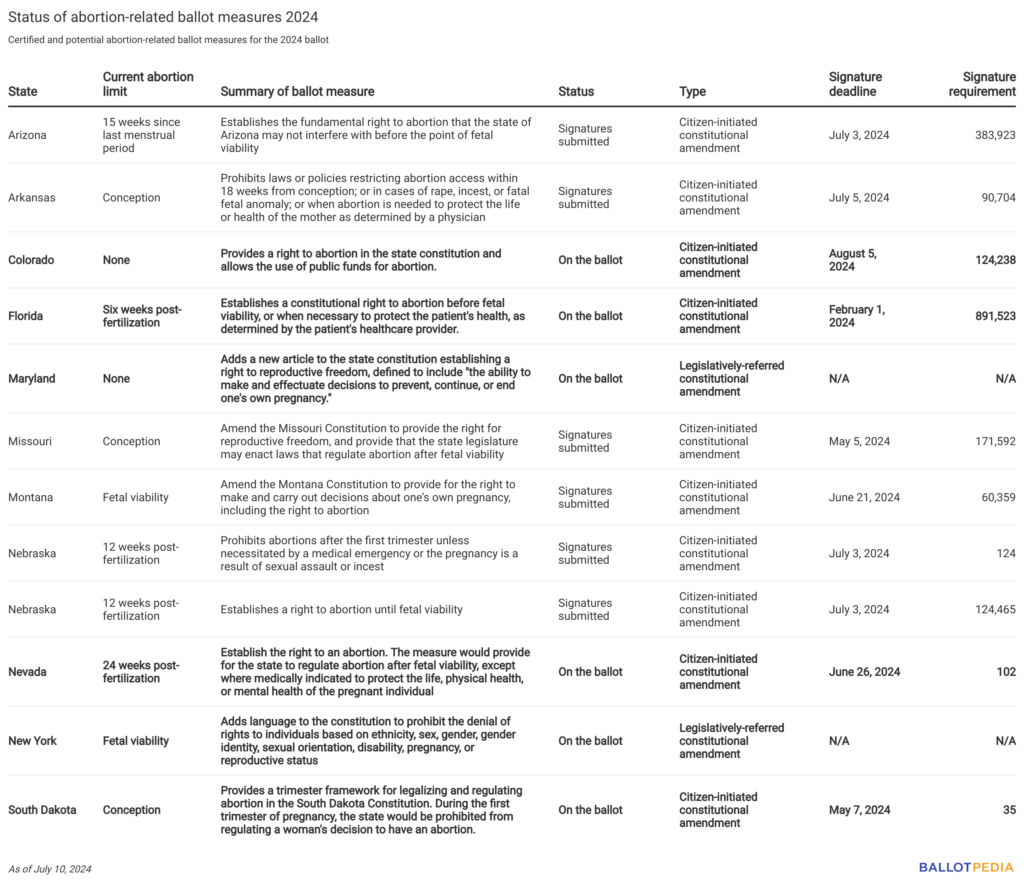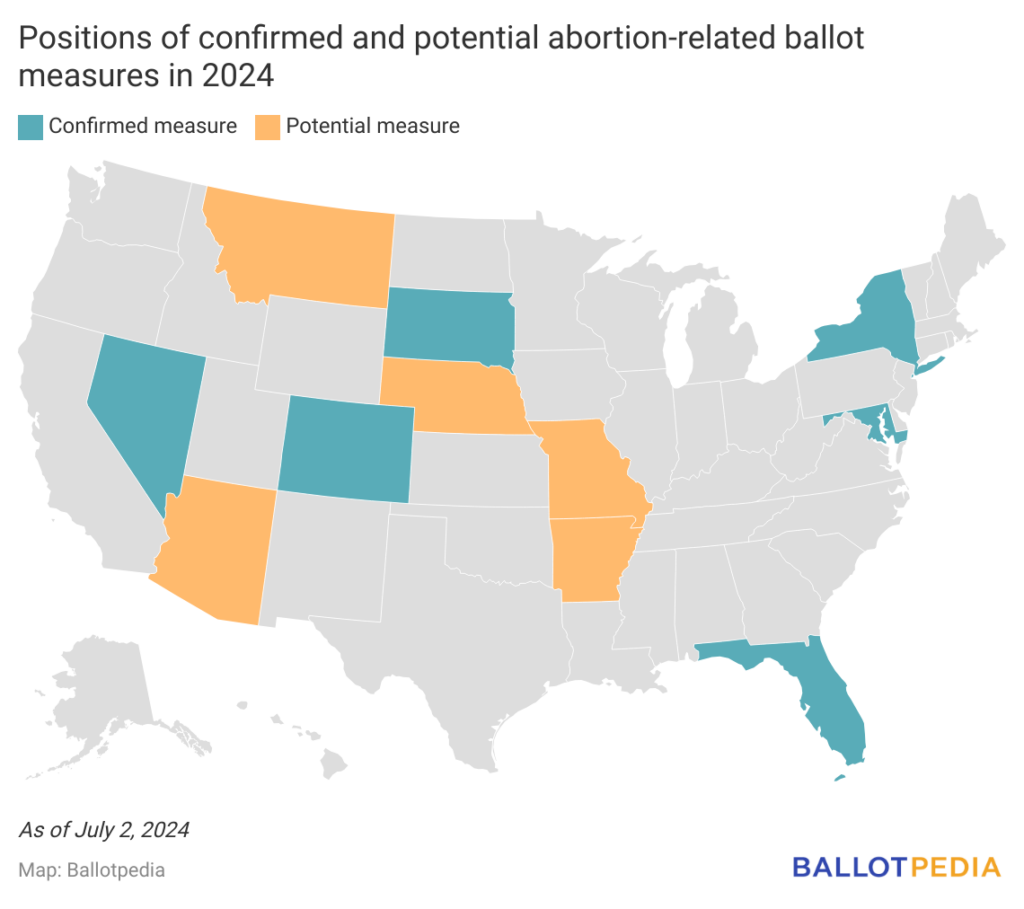Voters in six states—Colorado, Florida, Maryland, New York, Nevada, and South Dakota—will decide on abortion-related ballot measures in Nov. 2024. Initiatives are pending signature verification in five states—Arizona, Arkansas, Missouri, Montana, and Nebraska.
An abortion measure was most recently certified on the ballot in Nevada on June 28, when 128,000 signatures were verified for an initiative that would provide a state constitutional right to an abortion. At least 102,362 valid signatures were required.
Additionally, signatures were recently submitted for four ballot initiatives in three states—Arizona, Arkansas, and Nebraska.
On July 3, campaigns in Arizona and Nebraska submitted signatures for initiatives.
In Arizona, a campaign submitted 823,685 signatures for a constitutional amendment that would provide the fundamental right to abortion that the state of Arizona may not interfere with before the point of fetal viability. For the measure to qualify for the ballot, 383,923 verified signatures are required.
In Nebraska, two campaigns submitted signatures for initiatives. A campaign supporting a constitutional amendment establishing the right to an abortion before fetal viability submitted 207,000 signatures. A campaign supporting a constitutional amendment that would prohibit abortions after the first trimester except for certain circumstances submitted 205,000 signatures. For both initiatives, 124,465 verified signatures are needed to qualify for the ballot.
On July 5, in Arkansas, sponsors of an initiative that would prohibit laws or policies restricting abortion access within 18 weeks from conception reported submitting about 100,000 signatures, while 90,704 verified signatures are required for the initiative to qualify for the ballot.
Signatures are also pending verification for initiatives in Missouri and Montana.
This report provides the most recent updates on abortion-related ballot measure certifications and potential measures.
Here is the status of abortion-related ballot measures for 2024.

Certified abortion-related ballot measures in 2024

Colorado
Colorado voters will be deciding on a constitutional amendment that would provide a right to abortion in the state constitution. The initiative would prohibit the state or local governments from denying or impeding the right to an abortion and allow abortion to be a covered service under health insurance plans.
- Current law: Colorado is one of 10 states that does not restrict abortion after a specific point in a pregnancy. In 1984, Coloradans voted 50.4% to 49.6% to ban public funding of abortion except for cases where the mother's life is in danger. The provision prevented state health insurance from covering abortions for government employees and others on state health insurance plans such as Medicaid. In 1998, Coloradans voted 55% to 45% to require parents to be notified if their minor children seek an abortion and voted 51% to 49% to reject a ban on partial-birth abortion.
- Measure type: Initiated constitutional amendment
- Measure support: Coloradans for Protecting Reproductive Freedom is leading the campaign in support of the initiative. The committee reported $4.36 million in contributions and $3.62 million in expenditures as of June 12, 2024. Supporters also include the Democratic Party of Colorado, the ACLU of Colorado, and the League of Women Voters of Colorado.
- Measure opposition: The Pro-Life Colorado Fund is registered to oppose the initiative, but did not report campaign finance activity as of June 12, 2024. Opponents of the initiative include the organization March for Life.
- State political context: Colorado currently has a Democratic trifecta. In the previous presidential election in 2020, Joe Biden (D) won with 55.40% of the vote. Colorado has also seen more abortion-related ballot measures than any other state. There have been nine on the ballot since the first in 1984, and this year will increase that number to 10.
Florida
Amendment 4 would provide a constitutional right to abortion "before viability or when necessary to protect the patient’s health, as determined by the patient’s healthcare provider."
- Current law: On April 1, 2024, the Florida Supreme Court ruled that the state constitution's right to privacy does not include the right to abortion, overturning a previous decision by the court in 1989 that found that the privacy clause provided a right to abortion. The ruling allowed the state's 15-week abortion ban, passed by the legislature in 2022, to take effect. In 2023, the legislature passed another bill, called the Heartbeat Protection Act, to ban abortion at six weeks, which was contingent on the state supreme court overturning its prior ruling and allowing the 15-week ban to take effect. The six-week ban took effect on May 1. Before 2022, abortions were legal in Florida until 24 weeks.
- Measure type: Initiated constitutional amendment
- Measure support: Floridians Protecting Freedom is leading the campaign supporting the initiative. The campaign reported $32.26 million in contributions and $24.88 million in expenditures as of May 31, 2024. Supporters also include the ACLU of Florida, the League of Women Voters of Florida, the Fairness Project, and Planned Parenthood of Southwest and Central Florida. President Joe Biden (D) also announced support for the measure.
- Measure opposition: Florida Voters Against Extremism is leading the campaign in opposition to the initiative. The campaign reported $269,646.85 in contributions and $175,628.57 in expenditures. Florida Freedom Fund, created by Florida Governor Ron DeSantis (R), registered to oppose the initiative as well as Amendment 3, the marijuana legalization initiative. The campaign did not yet report contributions or expenditures. Opponents also include Attorney General Ashley B. Moody (R), the Republican Party of Florida, Susan B. Anthony Pro-Life America, the Florida Conference of Catholic Bishops, and the National Center for Life and Liberty.
- State political context: Florida currently has a Republican trifecta. In the previous presidential election in 2020, Donald Trump (R) won with 51.22% of the vote.
Maryland
Maryland voters will be deciding a constitutional amendment that would guarantee a right to reproductive freedom, including the ability to prevent, continue, or end one's own pregnancy. The ballot measure is designed to prohibit the constitutional right from being denied or infringed unless there is a compelling state interest, which would need to be achieved using the least restrictive means.
- Current law: Currently, abortion is legal in Maryland until viability. Abortion is legal after viability if the woman's life or health is endangered or there is a fetal anomaly.
- Measure type: Legislatively referred constitutional amendment
- Measure support: Freedom in Reproduction Maryland is leading the campaign supporting the amendment, though the committee has not reported any contributions. Supporters include Gov. Wes Moore (D) and Lt. Gov. Aruna Miller (D).
- Measure opposition: Health Not Harm MD is leading the campaign against the amendment. The committee reported over $5,000 in contributions. Opponents include the Maryland Catholic Conference, the Maryland Family Institute, and the Maryland Right to Life PAC.
- State political context: Maryland currently has a Democratic trifecta. In the previous presidential election in 2020, Joe Biden (D) won with 65.36% of the vote.
Nevada
Nevada voters will decide on a constitutional amendment to establish a state right to an abortion. The measure would allow for the state to regulate abortion after fetal viability, except where medically indicated to protect the life, physical health, or mental health of the pregnant woman.
- Current law: In Nevada, abortion is currently legal until 24 weeks of pregnancy.
- Measure type: Citizen-initiated constitutional amendment
- Measure support: The Nevadans for Reproductive Freedom PAC is leading the campaign in support of the initiative. Supporters include Vice Pres. Kamala Harris (D), the ACLU of Nevada, Planned Parenthood Votes Nevada, Reproductive Freedom for All Nevada, and Think Big America.
- Measure opposition: The Coalition for Parents and Children PAC is leading the campaign opposing the initiative. Opponents include Nevada Right to Life.
- State political context: Nevada currently has a divided government. The Republican Party controls the office of governor, while the Democratic Party controls both chambers of the state legislature. In the previous presidential election in 2020, Joe Biden (D) won with 50.06% of the vote.
New York
New York voters will decide on a constitutional amendment to prohibit the denial of a person's rights based on the person's "ethnicity, national origin, age, [and] disability," as well as the person's "sex, including sexual orientation, gender identity, gender expression, pregnancy, pregnancy outcomes, and reproductive healthcare and autonomy."
- Current law: New York allows for an abortion up to 24 weeks of pregnancy. Abortion is permitted after 24 weeks if the fetus is not viable or if the pregnant person's life or health (including mental health) is at risk
- Measure type: Legislatively referred constitutional amendment
- Measure support: New Yorkers for Equal Rights is leading the campaign in support of the initiative. Supporters include Gov. Kathy Hochul (D), U.S. Sen. Kirsten Gillibrand (D), the League of Women Voters of New York, the New York Civil Liberties Union, and the Planned Parenthood Action Fund.
- Measure opposition: The Coalition to Protect Kids-NY is leading the campaign in opposition to the initiative. Opponents of the amendment include the New York State Catholic Conference.
- State political context: New York currently has a Democratic trifecta. In the previous presidential election in 2020, Joe Biden (D) won with 60.87% of the vote.
South Dakota
Constitutional Amendment G would provide a trimester framework for regulating abortion in the South Dakota Constitution. During the first trimester of pregnancy, the state would be prohibited from regulating a woman's decision to have an abortion. During the second trimester of pregnancy, the state may regulate abortion, but "only in ways that are reasonably related to the physical health of the pregnant woman." And during the third trimester of pregnancy, the state may regulate or prohibit abortion, except "when abortion is necessary, in the medical judgment of the woman's physician, to preserve the life and health of the pregnant woman."
- Current law: In South Dakota, abortion is banned except to save the life of the mother. Following the U.S. Supreme Court’s 2022 decision, a 2005 law passed by the South Dakota State Legislature went into effect.
- Measure type: Initiated constitutional amendment
- Measure support: Dakotans for Health is leading the campaign in support of the initiative. The campaign reported $310,485.99 in contributions and $278,691.05 in expenditures as of December 31, 2023.
- Measure opposition: Life Defense Fund is leading the campaign opposing the initiative. The committee reported $267,008.82 in contributions and $248,252.58 in expenditures as of December 31, 2023.
- State political context: South Dakota currently has a Republican trifecta. In the previous presidential election in 2020, Donald Trump (R) won with 61.77% of the vote.
Potential abortion-related ballot measures in 2024
Arizona
The campaign Arizona for Abortion Access is working to place a constitutional amendment on the ballot that would establish a state constitutional right to abortion that the state may not interfere with before the point of fetal viability.
- Number of signatures needed: 383,923 valid signatures. On July 3, the Arizona for Abortion Access campaign reported submitting 823,685 signatures.
- Signature deadline: July 3, 2024
Arkansas
The Arkansans for Limited Government campaign is working to place a constitutional amendment on the ballot that would prohibit laws or policies restricting abortion access within 18 weeks from conception; in cases of rape, incest, or fatal fetal anomaly; or when abortion is needed to protect the life or health of the mother as determined by a physician.
- Number of signatures needed: 90,704 valid signatures. On July 5, proponents of the initiative reported submitting about 100,000 signatures.
- Signature deadline: July 5, 2024
Missouri
The Missourians for Constitutional Freedom campaign is working to place a constitutional amendment on the ballot that would provide the right to reproductive freedom, and provide that the state legislature may enact laws that regulate abortion after fetal viability. Signatures were submitted for the amendment on May 3, 2024. Proponents reported submitting 380,159 signatures.
- Number of signatures needed: 171,592 valid signatures
- Signature deadline: May 5, 2024
Montana
Montana voters may decide on a constitutional amendment that would provide for the right to make and carry out decisions about one’s own pregnancy, including a right to abortion.
- Number of signatures needed: 60,359 valid signatures. Montanans Securing Reproductive Rights reported submitting about 117,000 signatures to the secretary of state's office on June 21, 2024.
- Signature deadline: June 21, 2024
Nebraska
There are two potential abortion-related initiatives in Nebraska.
The Protect Our Rights campaign is working to place a constitutional amendment on the ballot that would establish a right to abortion until fetal viability.
- Number of signatures needed: 124,465 valid signatures. The Protect Our Rights campaign reported submitting 207,000 signatures.
- Signature deadline: July 5, 2024
Another constitutional amendment filed in Nebraska would prohibit abortions after the first trimester unless necessitated by a medical emergency or the pregnancy is a result of sexual assault or incest. The Protect Women & Children campaign is supporting the amendment.
- Number of signatures needed: 124,465 valid signatures. The Protect Women & Children campaign reported submitting 205,000 signatures.
- Signature deadline: July 5, 2024
Where have abortion measures been on the ballot since Dobbs?
Following the Dobbs v. Jackson Women’s Health Organization U.S. Supreme Court decision that overturned Roe v. Wade in 2022, seven abortion-related measures appeared on the ballot.
In 2022, there were six ballot measures addressing abortion— the most on record for a single year. Measures were approved in California, Michigan, and Vermont. Measures were defeated in Kansas, Kentucky, and Montana. The most recent abortion-related ballot measure to be passed by voters was Ohio Issue 1, which voters approved in Nov. 2023.
Additional reading:



